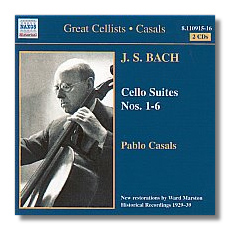
The Internet's Premier Classical Music Source
Related Links
- J.S. Bach Reviews
- Latest Reviews
- More Reviews
-
By Composer
-
Collections
DVD & Blu-ray
Books
Concert Reviews
Articles/Interviews
Software
Audio
Search Amazon
Recommended Links
Site News
 CD Review
CD Review
Johann Sebastian Bach

Cello Suites
- Suites for Solo Cello, BWV 1007-1012
- Adagio in A minor from Toccata, Adagio and Fugue, BWV 545
Pablo Casals, cello
Recordings made between 1929-39
Naxos Historical 8.110915-16 Monaural
Sometimes I think that my favorite piece of music is the one I just listened to. Then there are other items that really haunt me. There is no doubt that if I committed some crime so heinous that I would be exiled to an island and could take only one classical recording that it would be Bach's Cello Suites. I can also tell you that the recording would be this one.
Every once in awhile I listen to a recording that is a revelation. The word means that something is revealed. Such is the case here. I have, on occasion, described a listening experience as one where the performers are making music and not just playing it. In this case, we have a situation where the performer is discovering the music as he is making it.
Casals was one of the greatest musicians of this century and here you will hear why.
If you have never heard this music before, you are in for a treat. Most of you probably will want a stereo version to start with, unfortunately my version, a completely different experience, is Nathaniel Rosen's recordings on John Marks Records, which is no longer available. Rosen's is a much slower performance (Casals Suite One I: 16:54 to Rosen's 19:09 is not an exception) but not lugubrious. Rosen's is the Stokowski of interpretations. My tastes tend toward the romantic and would probably like Maisky's new release.
Phrasing is everything (pax Oscar) and the suites can sound like études if not done properly. I once owned a Philips recording with Gendron, but I found it too much etudie and gave it to my father. What Casals brings to this music is that dimension where the music comes alive. Any "serious" listener must have more than one recording of this music. There is so much going on in this, or any music, that one interpretation cannot capture all the implications. Just as I play the guitar and sing songs by Bob Dylan, etc., changing the phrasing each time, I explore another facet of music making; I learn from listening to the different recordings I have mentioned. If only one recording could be had, I have already told you that it would be Casals.
After writing the above, a recent issue of Gramophone (Awards Issue: 2000) included an essay on the Bach Suites in their "Masterclass" section. In it Heinrich Schiff comments, "I believe strongly that phrasing has a lot to do with thematic and harmonic structure." Simon Heighes, the author, notes that Casals, "Changed [the suites] from pedagogic exercises to universally acknowledged and loved masterpieces." Heighes goes on to offer the following observations. "[The Suites] were not actually conceived as a set… The Third Suite… might well have had its origins in domestic music-making in the Bach household itself… Despite their disparate origins, all six follow a similar pattern. To the traditional form of the suite – allemande, courante, sarabande, and gigue – Bach added an introductory Prélude with a pair of fashionable modern dances…" These few comments were among many that I found interesting. Unfortunately, the insert notes for the Casals and Rosen sets offer little about the music.
A bit of a digression here: I listened to these discs repeatedly over several evenings. I made notes, etc. I strongly recommend that you listen to the cello suites whilst reading philosophy. Now, I do not suggest the Platonic dialogues, but can endorse The Consolations of Philosophy by Alain de Botton. Nice mix.
Post Script: Whilst in the midst of listening, again and again, to the Casals recordings I also picked up a recording of three of the Suites recorded on double bass by Edgar Meyer on Sony 89183. What a mind-blower! The disc contains #2, 1 and 5 in that order. The opening of #2 has an almost Shostakovian feel to it. You need to hear this, too. Tell your intimate-other that it is an educational investment.
EMI has also issued these recordings. I have not heard them and so cannot comment on the quality of their transfers. Ward Marston remastered this Naxos set and he is one of the best in the world. If this review seems to ramble a bit, I am aware of that. So it goes.
Also, since writing the above I acquired the Suites as interpreted by Mstislav Rostropovich on EMI (273269). If you want an up-to-date sound and fantastic performance, this is the one that is available and earns not only my top recommendation, but also a rosette in the Penguin guide.
Copyright © 2001, Robert Stumpf II


















